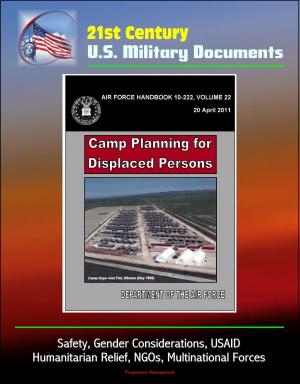Hezbollah's Passport: Shi’a Religion, Culture, and the Diaspora in Africa – Global Terrorists Emerging from Chaos of Lebanese Civil War, Examination of Religious and Cultural Aspects of its Foundation
Nonfiction, History, Middle East, Social & Cultural Studies, Political Science| Author: | Progressive Management | ISBN: | 9781370687848 |
| Publisher: | Progressive Management | Publication: | February 25, 2017 |
| Imprint: | Smashwords Edition | Language: | English |
| Author: | Progressive Management |
| ISBN: | 9781370687848 |
| Publisher: | Progressive Management |
| Publication: | February 25, 2017 |
| Imprint: | Smashwords Edition |
| Language: | English |
This excellent report has been professionally converted for accurate flowing-text e-book format reproduction. Hezbollah - The Party of God - emerged in the chaos of the Lebanese Civil War as a fringe Shi'a militia organization and evolved into a global non-state actor that wields considerable political and military power. The party's activities during the war, including the attack against the United States Marine Corps barracks in 1983, established the organization as the pre-eminent terrorist organization in the region. Following the war, Hezbollah expanded their operations to Africa and South America, targeting Israeli and Western interests' taking its concept of Islamic Resistance worldwide. The 2006 War between Hezbollah and Israel demonstrated its conventional military capability, delaying and disrupting IDF advances and retaining enough of its own strength to declare victory after a month long series of engagements. The current fight against the Islamic State in Iraq and Syria pits Hezbollah, allied with Iran, Syria, Iraqi Shi'a organizations and to an extent, the United States in a war to stabilize the region. The growth of Hezbollah, from a marginal branch of established Lebanese Shi'a political movements into the international power player, within 33 years is nothing short of remarkable. While the military aptitude and terrorist mystique of the party continue to capture the imagination of Western thinkers these characteristics are not the basis of Hezbollah's long-term success or strategy. The logic of the organization, derived from Islam and Lebanese culture, provide more insight into understanding Hezbollah than any examination of the tactics behind its terrorist or militant activities.
By examining the religious and cultural aspects of its foundation, Hezbollah emerges as much more than a militia that grew a political wing once the fighting stopped. Hezbollah is a movement that unites populations living in every corner of the world because of its unique form, combining religion and culture with political, militant, and social services that never strayed from the organization's founding Islamic doctrine. Hezbollah presents a complex problem for strategists and political thinkers; this monograph shows that the initial Western understanding of the group as a terrorist militia has not changed since the 1980s and fails to incorporate the logic, derived from religion and culture, into its actions and messages today.
Hezbollah is not a terrorist organization. This runs contrary to the opinion of most Western historians and strategists. However, in their rush to label the organization, they miss the nuance. Hezbollah's response to a 2003 civilian airline crash in the Republic of Benin, with many of its supporters onboard, demonstrates that the "Party of God" is much more than a violent collection of radicals fighting for a narrow ideology. In the days following the crash, Hezbollah sent counselors from Lebanon to Benin with condolence payments for the families of the dead passengers. Hezbollah's immediate reaction in consoling and caring for the families affected by the Benin crash indicates the importance of its religious and cultural attributes ignored by the analytical perception of Western sources. Hezbollah is a popular religious and cultural movement that appeals to a broad coalition of constitutes resulting in a dynamic political, social, and military organization that wields significant domestic control and international influence.
This excellent report has been professionally converted for accurate flowing-text e-book format reproduction. Hezbollah - The Party of God - emerged in the chaos of the Lebanese Civil War as a fringe Shi'a militia organization and evolved into a global non-state actor that wields considerable political and military power. The party's activities during the war, including the attack against the United States Marine Corps barracks in 1983, established the organization as the pre-eminent terrorist organization in the region. Following the war, Hezbollah expanded their operations to Africa and South America, targeting Israeli and Western interests' taking its concept of Islamic Resistance worldwide. The 2006 War between Hezbollah and Israel demonstrated its conventional military capability, delaying and disrupting IDF advances and retaining enough of its own strength to declare victory after a month long series of engagements. The current fight against the Islamic State in Iraq and Syria pits Hezbollah, allied with Iran, Syria, Iraqi Shi'a organizations and to an extent, the United States in a war to stabilize the region. The growth of Hezbollah, from a marginal branch of established Lebanese Shi'a political movements into the international power player, within 33 years is nothing short of remarkable. While the military aptitude and terrorist mystique of the party continue to capture the imagination of Western thinkers these characteristics are not the basis of Hezbollah's long-term success or strategy. The logic of the organization, derived from Islam and Lebanese culture, provide more insight into understanding Hezbollah than any examination of the tactics behind its terrorist or militant activities.
By examining the religious and cultural aspects of its foundation, Hezbollah emerges as much more than a militia that grew a political wing once the fighting stopped. Hezbollah is a movement that unites populations living in every corner of the world because of its unique form, combining religion and culture with political, militant, and social services that never strayed from the organization's founding Islamic doctrine. Hezbollah presents a complex problem for strategists and political thinkers; this monograph shows that the initial Western understanding of the group as a terrorist militia has not changed since the 1980s and fails to incorporate the logic, derived from religion and culture, into its actions and messages today.
Hezbollah is not a terrorist organization. This runs contrary to the opinion of most Western historians and strategists. However, in their rush to label the organization, they miss the nuance. Hezbollah's response to a 2003 civilian airline crash in the Republic of Benin, with many of its supporters onboard, demonstrates that the "Party of God" is much more than a violent collection of radicals fighting for a narrow ideology. In the days following the crash, Hezbollah sent counselors from Lebanon to Benin with condolence payments for the families of the dead passengers. Hezbollah's immediate reaction in consoling and caring for the families affected by the Benin crash indicates the importance of its religious and cultural attributes ignored by the analytical perception of Western sources. Hezbollah is a popular religious and cultural movement that appeals to a broad coalition of constitutes resulting in a dynamic political, social, and military organization that wields significant domestic control and international influence.















